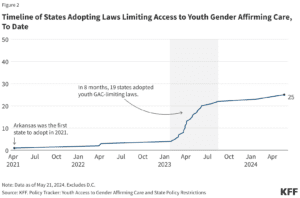 In the past six years, the introduction of bills in state legislatures to ban gender-affirming care for transgender and gender diverse youth has increased exponentially. In 2018, two such bills were introduced. In 2023, there were 185. Arkansas became the first state to ban gender-affirming care for youth in 2021; now, there are 26 states with bans on gender-affirming care for transgender youth. In response, other states have begun passing laws protecting access to gender-affirming care. It is estimated that 110,000 transgender teenagers, about 40 percent of transgender youth, live in states with bans on gender-affirming care.
In the past six years, the introduction of bills in state legislatures to ban gender-affirming care for transgender and gender diverse youth has increased exponentially. In 2018, two such bills were introduced. In 2023, there were 185. Arkansas became the first state to ban gender-affirming care for youth in 2021; now, there are 26 states with bans on gender-affirming care for transgender youth. In response, other states have begun passing laws protecting access to gender-affirming care. It is estimated that 110,000 transgender teenagers, about 40 percent of transgender youth, live in states with bans on gender-affirming care.
What is Gender-Affirming Care?
Gender-affirming care consists of an array of services, including both medical and non-medical interventions for transgender and gender diverse people. Medical services can include hormone therapy, surgery, and mental health services. Non-medical services can include adopting gender-affirming hairstyles, clothing, names, gender pronouns, and restrooms and other facilities.1
Gender-affirming medical care for youth most often consists of puberty blockers that stop the onset of puberty. Doctors say the goal of puberty blockers is to give young people time to mature enough mentally and emotionally to make informed decisions about whether to pursue permanent treatment. Once someone stops taking them, puberty starts again as normal. Gender-affirming medical care for youth can also include hormone therapy and, rarely, surgical intervention.2
What Kinds of Bills Have Passed?
The details of state bans on gender-affirming care vary, but in general, the laws prevent transgender minors from accessing puberty blockers, hormones, and surgery. More than 20 states have passed laws that punish health care professionals for providing gender-affirming care to their minor patients. Five states have made it a felony, and in eight states it is illegal for providers to offer minors referrals for care outside their state or otherwise aid and abet access to gender-affirming care.3
Sixteen states and the District of Columbia have shield laws that protect access to gender-affirming care for transgender and gender diverse youth. Shield laws vary by state but generally preserve minors’ access to gender-affirming care and protect patients, guardians, and medical professionals from prosecution for seeking or providing care.4
What Do Opponents of Gender-Affirming Care for Minors Say?
Opponents of providing gender-affirming care point to examples of people who began their transition and later expressed regret or decided to de-transition later in life. They argue that minors are not mature enough to make such life-altering decisions.
“We need to just pause, we need to understand what these emerging therapies actually may potentially do to our kids. My heart goes out to them. … This is an extremely uncomfortable position for me to be in. I don’t like it. But I have to do what I believe right now is in the best interest of the kids,” said Iowa Gov. Kim Reynolds when signing the state’s ban on gender-affirming care for minors.5
Opponents also point to increasing restrictions abroad. The National Health Service in England recently ended the practice of prescribing puberty blockers to children, citing a lack of evidence of the safety and effectiveness to make them a part of routine treatment.6 Many other European countries do not allow the use of cross-sex hormones until age 16, and only then allow them after a patient has completed several psychotherapy sessions. In addition, most European countries ban gender-affirming surgery until age 16.7
What Do Supporters of Gender-Affirming Care for Minors Say?
Nearly all major U.S. medical associations support youth access to gender-affirming care, including the American Medical Association, the American Academy of Pediatrics, and the American Psychological Association. In particular, these groups point to evidence demonstrating that medically necessary gender-affirming care enhances mental health outcomes for transgender youth, including by reducing suicidal ideation.8
The AMA released this statement after Arkansas passed its ban: “Decisions about medical care belong within the sanctity of the patient-physician relationship. … We believe it is inappropriate and harmful for any state to legislatively dictate that certain transition-related services are never appropriate and limit the range of options physicians and families may consider when making decisions for pediatric patients.”9
Supporters also argue that transgender and nonbinary minors are not the only youth seeking gender-affirming care. A Harvard T.H. Chan School of Public Health study examined 2019 data for 22,827,194 youth with health insurance. It found that most gender-affirming surgeries for both transgender and cisgender (someone whose gender identity matches their sex at birth) youth were chest-related surgeries, and 97% of breast reduction surgeries were for cisgender males. Breast augmentation surgery for cisgender females is likewise considered gender-affirming medical care.10 Supporters point to this data and note that the same surgeries that are being banned for transgender and gender diverse youth are relatively unregulated for their cisgender counterparts.
Are There Any Federal Bills in Congress?
Like in state legislatures, there have been bills introduced in Washington, D.C., that would ban gender-affirming care for youth and others that would protect it. Rep. Marjorie Taylor Green (R-Ga.) introduced H.R.1399, the Protecting Children’s Innocence Act, which would make it a felony to perform any gender-affirming care on a transgender minor, prohibit the use of federal funds for gender-affirming care or for health insurance that covers such care, and prohibit universities from offering instruction in gender-affirming care.11 Sen. Ed Markey (D-Mass.) introduced S.2246, the Gender-Affirming Care Access Research for Equity (CARE) Act, which would provide $25 million in funding for the National Institutes of Health and the Centers for Disease Control and Prevention to research barriers to gender-affirming care and the impact of those barriers on the health of transgender teens.12
Discussion Questions
- Do you think gender-affirming care should be banned until an individual turns 18?
- Does your state have laws about gender-affirming care? If so, do you agree or disagree with those laws? Why?
- Should more temporary medical interventions, like puberty blockers, be treated differently than more permanent treatments, like hormone therapy or surgery?
- What authority, if any, should the government have over medical care decisions for citizens?
Additional Resources
- Explore a Kaiser Family Foundation map and database of laws and bills banning gender-affirming care: Policy Tracker: Youth Access to Gender-Affirming Care and State Policy Restrictions
- Read a Harvard Study on the Prevalence of Gender-Affirming Surgical Procedures Among Minors and Adults in the U.S.
- NPR reports: Her State Bans Gender-Affirming Care for Teenagers. So She Travels 450 Miles for It
- Reuters investigates gender-affirming care in Youth in Transition
Related Blog Posts
As always, we encourage you to join the discussion with your comments or questions below.
Close Up is proud to be the nation’s leading nonprofit civic education organization, working with schools and districts across the country since 1971. If you would like to partner with us or learn more about our experiential learning programs, professional development, or curriculum design and consulting, contact us today!
Sources
Featured Image Credit: KFF. Policy Tracker: Youth Access to Gender Affirming Care and State Policy Restrictions
[1] Office of Population Affairs: https://opa.hhs.gov/sites/default/files/2022-03/gender-affirming-care-young-people-march-2022.pdf
[2] CNN: https://www.cnn.com/2024/03/15/health/puberty-blockers-explained-nhs-wellness/index.html#:~:text=%E2%80%9CThe%20use%20of%20puberty%20blockers,started%2C%20bone%20mineralization%20normalizes.%E2%80%9D
[3] Association of Medical Colleges, https://www.aamc.org/news/states-are-banning-gender-affirming-care-minors-what-does-mean-patients-and-providers; NPR: https://www.npr.org/sections/shots-health-news/2024/07/03/nx-s1-4986385/trans-kids-health-bans-gender-affirming-care
[4] UCLA Law: https://law.ucla.edu/academics/centers/center-reproductive-health-law-and-policy/shield-laws-reproductive-and-gender-affirming-health-care-state-law-guide#:~:text=Currently%2C%20through%20legislation%20or%20executive,to%20gender%2Daffirming%20health%20care.
[5] Des Moines Register: https://www.desmoinesregister.com/story/news/politics/2023/03/21/kim-reynolds-says-iowa-should-pause-gender-affirming-care-to-trans-kids/70034427007/
[6] The Guardian: https://www.theguardian.com/society/2024/mar/12/children-to-stop-getting-puberty-blockers-at-gender-identity-clinics-says-nhs-england
[7] Forbes: https://www.forbes.com/sites/joshuacohen/2023/06/06/increasing-number-of-european-nations-adopt-a-more-cautious-approach-to-gender-affirming-care-among-minors/
[8] Endocrine Society: https://www.endocrine.org/news-and-advocacy/news-room/2023/ama-gender-affirming-care
[9] American Medical Association: https://www.ama-assn.org/press-center/press-releases/ama-states-stop-interfering-health-care-transgender-children
[10] JAMA Network Open: https://jamanetwork.com/journals/jamanetworkopen/fullarticle/2820437
[11] H.R. 1399 Protecting Children’s Innocence Act: https://www.congress.gov/bill/118th-congress/house-bill/1399
[12] Gender-Affirming Care Access Research for Equity Act: https://www.congress.gov/bill/118th-congress/senate-bill/2246?q=%7B%22search%22%3A%22care+act+gender%22%7D&s=1&r=1
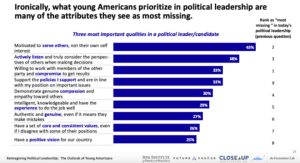 When poll participants were asked to list the three most important qualities they look for in a political candidate, they listed a motivation to serve others as the highest priority. They also said they want leaders who actively listen to and consider the perspectives of others and who are willing to compromise to get results. Interestingly, they ranked all three of those attributes above the priority of a leader supporting the policies that the poll participants support.
When poll participants were asked to list the three most important qualities they look for in a political candidate, they listed a motivation to serve others as the highest priority. They also said they want leaders who actively listen to and consider the perspectives of others and who are willing to compromise to get results. Interestingly, they ranked all three of those attributes above the priority of a leader supporting the policies that the poll participants support.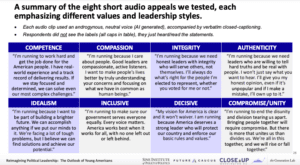 Respondents were asked to rate, on a scale of 1-10, how appealing they found each campaign pitch.
Respondents were asked to rate, on a scale of 1-10, how appealing they found each campaign pitch.
 At the end of July, high school students throughout the District came together for the first annual HISD Civic Ambassador Training. The brainchild of HISD’s Community Partnerships Department, the training offered students an opportunity to become their schools’ “Civic Ambassadors.”
At the end of July, high school students throughout the District came together for the first annual HISD Civic Ambassador Training. The brainchild of HISD’s Community Partnerships Department, the training offered students an opportunity to become their schools’ “Civic Ambassadors.” The rapid thumps of hearts beating with thrill, the rejuvenating scent of exhilaration in the air, the movement of gliding past people swiftly. This is not a group of kids whizzing through a ski run—this is a group of 26 PHS students receiving an exclusive, behind-the-scenes tour of the Capitol Building in Washington, D.C.
The rapid thumps of hearts beating with thrill, the rejuvenating scent of exhilaration in the air, the movement of gliding past people swiftly. This is not a group of kids whizzing through a ski run—this is a group of 26 PHS students receiving an exclusive, behind-the-scenes tour of the Capitol Building in Washington, D.C.
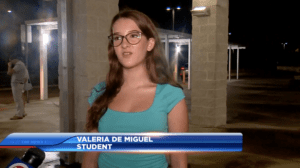 WEST BROWARD, FLA. (WSVN) – Approximately 300 foreign-born and newly arrived immigrants, Broward County Public Schools (BCPS) high school students, are set to participate in Rally to the Tally for new Floridians starting Tuesday.
WEST BROWARD, FLA. (WSVN) – Approximately 300 foreign-born and newly arrived immigrants, Broward County Public Schools (BCPS) high school students, are set to participate in Rally to the Tally for new Floridians starting Tuesday.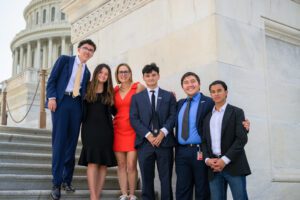
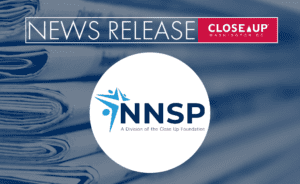 Arlington, VA – The Close Up Foundation is pleased to announce that it has merged with the National Network of Schools in Partnership (NNSP), with NNSP becoming a division of Close Up effective July 1, 2023.
Arlington, VA – The Close Up Foundation is pleased to announce that it has merged with the National Network of Schools in Partnership (NNSP), with NNSP becoming a division of Close Up effective July 1, 2023. 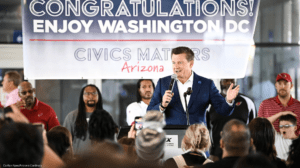 Franchise teams with Close Up to send high school students on team plane…Johnson’s essay was what got him to Phoenix Sky Harbor Airport on Wednesday morning, one of 260 students chosen — based on their essays — to take part in the second annual Civics Matter Arizona trip to Washington D.C. Pairing with the Close Up Foundation…
Franchise teams with Close Up to send high school students on team plane…Johnson’s essay was what got him to Phoenix Sky Harbor Airport on Wednesday morning, one of 260 students chosen — based on their essays — to take part in the second annual Civics Matter Arizona trip to Washington D.C. Pairing with the Close Up Foundation…






